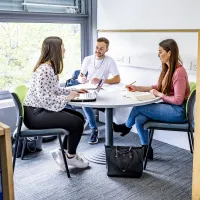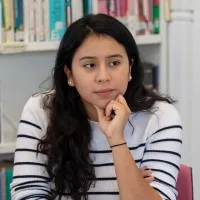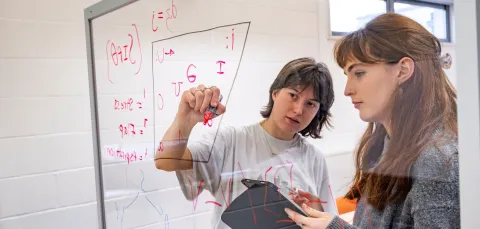About this course
This course is not open to applicants for 2026 entry. Search similar degrees by browsing our course finder.
Spend your third year in Spain, studying maths at one of our partner universities. This degree is a fantastic opportunity to immerse yourself in Spanish, while developing your mathematical problem-solving skills. You’ll study pure and applied mathematics, statistics and operational research. You’ll graduate with sought after skills in mathematics as well as experience of working and studying in another language.
This BSc Maths with Spanish degree covers the foundations of algebra, calculus and statistics. You’ll investigate the applications of mathematics in a variety of contexts and use mathematical and statistical models.
As part of this course you’ll:
- be able to specialise in pure or applied mathematics, operational research or statistics
- become proficient in Spanish, understanding subtleties and holding formal and informal conversations with ease
- spend your third year at one of our Erasmus partner institutions in Madrid, Malaga, or Santiago de Compostela
- use our student centre, a dedicated learning and social space for maths students
- use mathematical and computational packages such as Python and the statistics package 'R'
You’ll be taught through a combination of lectures and workshops by leading researchers. Their fields of expertise include group theory, the mathematics of nature, and experimental design.
We regularly review our courses to ensure and improve quality. This course may be revised as a result of this. Any revision will be balanced against the requirement that the student should receive the educational service expected. Find out why, when, and how we might make changes.
Our courses are regulated in England by the Office for Students (OfS).
Entry requirements
For Academic year
Scottish Qualification
Offers will be based on exams being taken at the end of S6. Subjects taken and qualifications achieved in S5 will be reviewed. Careful consideration will be given to an individual’s academic achievement, taking in to account the context and circumstances of their pre-university education.
Please see the University of Southampton’s Curriculum for Excellence Scotland Statement (PDF) for further information. Applicants are advised to contact their Faculty Admissions Office for more information.
Other requirements
You might meet our criteria in other ways if you do not have the qualifications we need. Find out more about:
- skills you might have gained through work or other life experiences (otherwise known as recognition of prior learning)
Find out more about our Admissions Policy.
Got a question?
Please contact our enquiries team if you're not sure that you have the right experience or qualifications to get onto this course.
Email: enquiries@southampton.ac.uk
Tel: +44(0)23 8059 5000
Course structure
This degree gives you a technical background in mathematics. You'll also gain advanced skills in communicating in Spanish by following our 7-stage language learning programme.
In your first 2 years you'll build a foundational knowledge of maths. You'll also gain skills in listening, understanding, speaking and writing in Spanish.
Your third year gives you the opportunity to immerse yourself in Spanish language and culture as you study in a maths department at a partner university in Spain.
Your final year gives you the opportunity to build your language skills and choose specialist areas in maths.
You do not need to select your modules when you apply. Your academic tutor will help you to customise your course.
Year 1 overview
You'll cover fundamental areas of maths. You'll expand your existing knowledge of calculus by gaining a deeper understanding of its' underlying ideas, and then extending them into higher dimensions.
Linear algebra develops yours skills in accurately manipulating vectors and matrices.
You'll also learn about probability and statistics, and explore operational research.
You'll complete Spanish Language Stage 4, which will give you skills to:
- extract and synthesise key information from written and spoken sources
- develop analytical and evaluative thinking
- learn problem-solving skills
Year 2 overview
In maths, you'll learn about analysis and differential equations. You'll be able to choose different groups of modules. For example, you can:
- study group theory - one of the great simplifying and unifying ideas in modern mathematics, along with geometry and topology
- focus on applied mathematics - applying the techniques from complex numbers and multivariable calculus to model airflow over a wing
- choose statistics - learning about statistical distributions and statistical modelling
There are also options from operational research or financial mathematics.
In Spanish, you'll progress to Stage 5. This will give you skills to:
- reflect critically and make judgements based on evidence and argument
- interpret layers of meaning within texts and other cultural products
- use language creatively and precisely for a range of purposes and audiences
Year 3 overview
You'll spend your third year in Spain, usually in the mathematics department of an Erasmus partner university.
This year is your opportunity to immerse yourself in Spanish, and gain a deep understanding of the social, economic and political make-up of your host country.
Year 4 overview
You'll return to Southampton to complete your degree. From pure mathematics you could study:
- Galois theory
- number theory
- infinite dimensional spaces
- algebraic invariants of a shape
Or, you could apply your statistical knowledge to the design of experiments or to simulating statistical events.
In applied mathematics you could:
- model black holes and cosmology
- model epidemics and biochemical reactions
- learn about Laplace and Fourier transforms
- study solutions of the Navier-Stokes equation
You could also choose from topics in optimisation, actuarial mathematics, or modern applications of mathematics such as machine learning and social networks.
You’ll also complete a project, choosing from:
- Maths and your Future - work in a small team to analyse data and apply your mathematical learning to a problem raised by a local or national employer
- Mathematical Investigation and Communication - learn independently about new areas of mathematics, or apply your skills of modelling and computation
- Communicating and Teaching Mathematics - act as an ambassador for mathematics in schools and gain classroom experience
You'll complete your Spanish studies at Level 7, which is an advanced level of proficiency. You'll be able to understand the language with ease, including subtleties of meaning and nuance.
Want more detail? See all the modules in the course.
Modules
The modules outlined provide examples of what you can expect to learn on this degree course based on recent academic teaching. As a research-led University, we undertake a continuous review of our course to ensure quality enhancement and to manage our resources. The precise modules available to you in future years may vary depending on staff availability and research interests, new topics of study, timetabling and student demand. Find out why, when and how we might make changes.
For entry in academic year 2025 to 2026
Year 1 modules
You must study the following modules in year 1:
First Year Mathematics Workshop
Linear Algebra II
Building on the intuitive understanding and calculation techniques from Linear Algebra I, this module introduces the concepts of vector spaces and linear maps in an abstract, axiomatic way. In particular, matrices are revisited as the representation of a ...
Spanish Language Stage 4
The aim of every language course at the University is to enable you to communicate in your target language (TL) at that particular level and in your particular area of interest. We use the word ‘communicate’ in its widest sense, meaning that you will not ...
You must also choose from the following modules in year 1:
Year 2 modules
You must study the following modules in year 2:
Analysis
The notion of limit and convergence are two key ideas on which rest most of modern Analysis. This module aims to present these notions building on the experience gained by students in first year Calculus module. The context of our study is: limits and co...
Partial Differential Equations
Differential equations occupy a central role in mathematics because they allow us to describe a wide variety of real-world systems. Their study and applications range from pure and applied mathematics to physics, engineering , biology and finance, among ...
Preparation for your Third Year (Abroad)
This module was co-designed by LCL students and staff, and it is aimed at preparing participants for a period of cultural immersion (abroad) in their third year. Participants will be informed about the third-year assessment, Residence Abroad Portfolio...
Spanish Language Stage 5
The aim of every language course at the University is to enable you to communicate in your target language (TL) at that particular level and in your particular area of interest. We use the word ‘communicate’ in its widest sense, meaning that you will not ...
You must also choose from the following modules in year 2:
Algorithms
Algorithms are systematic methods for solving mathematical problems, such as sorting numbers in ascending order, finding the cheapest way to ship goods on the road network or finding the shortest path in a graph. They can be regarded as practical applicat...
Fields and Fluids
Over the last four hundred years progress in understanding the physical world (theoretical physics) has gone hand in hand with progress in the mathematical sciences, so much so that the terms applied mathematics and theoretical physics have come to be alm...
Financial Mathematics
This module provides a solid mathematical introduction to the subject of Compound Interest Theory and its application to the analysis of a wide variety of complex financial problems, including those associated with mortgage and commercial loans, the valua...
Geometry and Topology
Geometry has grown out of efforts to understand the world around us, and has been a central part of mathematics from the ancient times to the present. Topology has been designed to describe, quantify, and compare shapes of complex objects. Together, geome...
Group Theory
Group theory is one of the great simplifying and unifying ideas in modern mathematics. It was introduced in order to understand the solutions to polynomial equations, but only in the last one hundred years has its full significance, as a mathematical for...
Operational Research II
Operational Research (OR) uses mathematical modelling and optimisation to solve complex, real-life problems. This module will introduce some key OR techniques that are widely used to support important decisions in a wide range of applications including tr...
Stochastic Processes
The module will introduce the basic ideas in modelling, solving and simulating stochastic processes.
Year 3 modules
You must study the following module in year 3:
Year 4 modules
You must study the following modules in year 4:
Mathematics Project
This module is compulsory for every Year 3 student of any Mathematical Sciences degree programme. Its main goal is to provide the student with an opportunity to research an area of mathematics that interests them, while strengthening their transferrable s...
Spanish Language Stage 7
The aim of every language course at the University is to enable you to communicate in your target language at that particular level and in your particular area of interest. We use the word ‘communicate’ in its widest sense, meaning that you will not only ...
You must also choose from the following modules in year 4:
Actuarial Mathematics I
This subject arises through a fusion of compound interest theory with probability theory, and provides the mathematical framework necessary for analysing such contracts, which are essentially long term financial transactions in which the various cash flow...
Actuarial Mathematics II
Synopsis: The module extends the mathematical framework developed in MATH3063 in order to enable modelling of long term financial transactions where the various cash flows are contingent on the death or survival of several lives, or where there are sever...
Advanced Fluid Dynamics
Modelling fluid flow requires us first to extend vector calculus to include volumes that change with time. This will allow us to rephrase Newton’s second law of motion, that the force is equal to the time derivative of the linear momentum, in a way that ...
Advanced Partial Differential Equations
Partial Differential Equations (PDEs) occur frequently in many areas of mathematics. This module extends earlier work on PDEs by presenting a variety of more advanced solution techniques together with some of the underlying theory.
Algebraic Topology
Topology is concerned with the way in which geometric objects can be continuously deformed to one another. It can be thought of as a variation of geometry where there is a notion of points being "close together" but without there being a precise measure o...
Algorithms
Algorithms are systematic methods for solving mathematical problems, such as sorting numbers in ascending order, finding the cheapest way to ship goods on the road network or finding the shortest path in a graph. They can be regarded as practical applicat...
Design and Analysis of Experiments
A well-designed experiment is an efficient way of learning about the world. Typically, an experiment may involve varying several factors and observing the value of a response at settings of combinations of values of these factors. The mathematical challen...
Fields and Fluids
Over the last four hundred years progress in understanding the physical world (theoretical physics) has gone hand in hand with progress in the mathematical sciences, so much so that the terms applied mathematics and theoretical physics have come to be alm...
Financial Mathematics
This module provides a solid mathematical introduction to the subject of Compound Interest Theory and its application to the analysis of a wide variety of complex financial problems, including those associated with mortgage and commercial loans, the valua...
Further Number Theory
Number Theory is the study of integers and their generalisations such as the rationals, algebraic integers or finite fields. The problem more or less defining Number Theory is to find integer solutions to equations, such as the famous Fermat equation x^n ...
Galois Theory
This module is designed for students in their third year and aims to introduce the basic concepts and techniques of Galois theory, building on earlier work at level 2. As such, it will provide an introduction to core concepts in rings, fields, polynomials...
Geometry and Topology
Geometry has grown out of efforts to understand the world around us, and has been a central part of mathematics from the ancient times to the present. Topology has been designed to describe, quantify, and compare shapes of complex objects. Together, geome...
Graph Theory
Graph theory was born in 1736 with Euler’s solution of the Königsberg bridge problem, which asked whether it was possible to plan a walk over the seven bridges of the town without re-tracing one’s steps. Euler realised that the problem could be rephrased ...
Group Theory
Group theory is one of the great simplifying and unifying ideas in modern mathematics. It was introduced in order to understand the solutions to polynomial equations, but only in the last one hundred years has its full significance, as a mathematical for...
Hilbert Spaces
This module is an introduction to the functional analysis of Hilbert spaces. The subject of functional analysis builds on the linear algebra studied in the first year and the analysis studied in the second year. Initially pivotal in Fourier theory and di...
Integral Transform Methods
Many classes of problems are difficult to solve in their original domain. An integral transform maps the problem from its original domain into a new domain in which solution is easier. The solution is then mapped back to the original domain with the inver...
Mathematical Biology
Biology is undergoing a quantitative revolution, generating vast quantities of data that are analysed using bioinformatics techniques and modelled using mathematics to give insight into the underlying biological processes. This module aims to give a flavo...
Mathematical Finance
Following an initial discussion of the assessment and measurement of investment risk, mean-variance portfolio theory is introduced and used to determine the risk and return for a portfolio of risky assets, the composition of the optimal such portfolio, an...
Mathematical Programming
- Linear programs: their basic properties; the simplex algorithm. - Duality: the relationship between a linear program and its dual, duality theorems, complementarity, and the alternative; sensitivity analysis. - The interior point method for convex op...
Numerical Methods
Introduce the students to the practical application of a relatively wide spectrum of numerical techniques and familiarise the students with numerical coding. Often in mathematics, it is possible to prove the existence of a solution to a given problem, ...
Operational Research II
Operational Research (OR) uses mathematical modelling and optimisation to solve complex, real-life problems. This module will introduce some key OR techniques that are widely used to support important decisions in a wide range of applications including tr...
Optimization
Module Contents: This module discusses continuous optimization problems where either the objective function or constraint functions or both are nonlinear. It explains optimality conditions, that is, which conditions an optimal solution must satisfy. It in...
Relativity, Black Holes and Cosmology
This is a module principally on Einstein's general theory of relativity, a relativistic theory of gravitation which explains gravitational effects as coming from the curvature of space-time. It provides a comprehensive introduction to material which is cu...
Statistical Distribution Theory
Functions of one and several random variables are considered such as sums, differences, products and ratios. The central limit theorem is proved and the probability density functions are derived of those sampling distributions linked to the normal distrib...
Statistical Inference
Statistical inference involves using data from a sample to draw conclusions about a wider population. Given a partly specified statistical model, in which at least one parameter is unknown, and some observations for which the model is valid, it is possibl...
Statistical Methods in Insurance
Statistical Modelling I
Simple linear regression is developed for one explanatory variable using the principle of least squares. The extension to two explanatory variables raises the issue of whether both variables are needed for a well-fitting model, or whether one is sufficien...
Statistical Modelling II
The module Statistical Modelling II covers in detail the theory of linear regression models, where explanatory variables are used to explain the variation in a response variable, which is assumed to be normally distributed. However, in many practical situ...
Stochastic Processes
The module will introduce the basic ideas in modelling, solving and simulating stochastic processes.
Structure and Dynamics of Networks
Networks are ubiquitous in the modern world: from the biological networks that regulate cell behaviour, to technological networks such as the Internet and social networks such as Facebook. Typically real-world networks are large, complex, and exhibit both...
Survival Models
This module introduces some of the fundamental ideas and issues of lifetime and time-to-event data analysis, as used in actuarial practice, biomedical research and demography.
Vector Calculus and Complex Variable
In the first part of this module we build on multivariate calculus studied in the first year and extend it to the calculus of scalar and vector functions of several variables. Line, surface and volume integrals are considered and a number of theorems inv...
Learning and assessment
The learning activities for this course include the following:
- lectures
- classes and tutorials
- coursework
- individual and group projects
- independent learning (studying on your own)
Course time
How you'll spend your course time:
Year 1
Study time
Your scheduled learning, teaching and independent study for year 1:
How we'll assess you
- coursework, laboratory reports and essays
- individual and group projects
- oral presentations
- teamwork
- written and practical exams
- written exams
Your assessment breakdown
Year 1:
Year 2
Study time
Your scheduled learning, teaching and independent study for year 2:
How we'll assess you
- coursework, laboratory reports and essays
- individual and group projects
- oral presentations
- teamwork
- written and practical exams
- written exams
Your assessment breakdown
Year 2:
Year 3
Study time
Your scheduled learning, teaching and independent study for year 3:
How we'll assess you
- coursework, laboratory reports and essays
- individual and group projects
- oral presentations
- teamwork
- written and practical exams
- written exams
Your assessment breakdown
Year 3:
Year 4
Study time
Your scheduled learning, teaching and independent study for year 4:
How we'll assess you
- coursework, laboratory reports and essays
- individual and group projects
- oral presentations
- teamwork
- written and practical exams
- written exams
Your assessment breakdown
Year 4:
Academic support
You’ll be supported by a personal academic tutor and have access to a senior tutor.
Course leader
Philip Greulich is the course leader.
Careers and employability
Employability skills
This degree will allow you to develop and evidence subject-specific and targeted employability skills. This includes the required skill set for a range of future careers, further study, or starting your own business.
The skills you can expect to focus on and gain from this course include:
- Research
- Critical thinking
- Self-management
- Confidence
- Communication
- Adaptability
- Problem solving
- Resilience
The employability and enterprise skills you'll gain from this course are reflected in the Southampton skills model. When you join us you'll be able to use our skills model to track, plan, and benefit your career development and progress.
Download skills overview
Career pathways
Graduates commonly work in a range of organisations or sectors including:
Education,
Engineering,
Finance,
Banking,
Accountancy,
Government,
Insurance,
IT,
Business consultancy,
Marketing,
Market research,
Health,
Research.
- Actuary
- Data scientist
- Investment analyst
- Research scientist (maths)
- Software engineer
- Statistician
- Diplomatic service officer
- Intelligence analyst
- Interpreter
- Political risk analyst
- Academic researcher
- Financial manager
- Game designer
- Management consultant
- Meteorologist
- Operational researcher
- Quantity surveyor
- International aid worker
- Broadcast journalist
- Financial trader
- Electoral assistant
- Management trainee
- Data analyst
- Data engineer
- Actuary
- Audit associate
- Finance analyst
- Maths teacher
- Trainee accountant
- Web analytics developer
Job prospects for BSc Mathematics with Spanish graduates
*Example graduate job titles and job prospect statistics taken from The Graduate Outcomes Survey, which gathers information about the activities and perspectives of graduates 15 months after finishing their course.

Work experience opportunities
Choosing to do work experience is a great way to enhance your employability, build valuable networks, and evidence your potential. Learn about the different work and industry experience options at Southampton.
Careers services and support
We are a top 20 UK university for employability (QS Graduate Employability Rankings 2022). Our Careers, Employability and Student Enterprise team will support you. This support includes:
- work experience schemes
- CV and interview skills and workshops
- networking events
- careers fairs attended by top employers
- a wealth of volunteering opportunities
- study abroad and summer school opportunities
We have a vibrant entrepreneurship culture and our dedicated start-up supporter, Futureworlds, is open to every student.
Your career ideas and graduate job opportunities may change while you're at university. So it is important to take time to regularly reflect on your goals, speak to people in industry and seek advice and up-to-date information from Careers, Employability and Student Enterprise professionals at the University.
Fees, costs and funding
Tuition fees
Fees for a year's study:
- UK students pay £9,535.
- EU and international students pay £24,800.
What your fees pay for
Your tuition fees pay for the full cost of tuition and standard exams.
Find out how to:
Accommodation and living costs, such as travel and food, are not included in your tuition fees. There may also be extra costs for retake and professional exams.
Explore:
Bursaries, scholarships and other funding
If you're a UK or EU student and your household income is under £36,200 a year, you may be able to get a University of Southampton bursary to help with your living costs. Find out about bursaries and other funding we offer at Southampton.
If you're a care leaver or estranged from your parents, you may be able to get a specific bursary.
Get in touch for advice about student money matters.
Scholarships and grants
You may be able to get a scholarship or grant to help fund your studies.
We award scholarships and grants for travel, academic excellence, or to students from under-represented backgrounds.
Support during your course
The Student Hub offers support and advice on money to students. You may be able to access our Student Support fund and other sources of financial support during your course.
Funding for EU and international students
Find out about funding you could get as an international student.
How to apply
What happens after you apply?
We will assess your application on the strength of your:
- predicted grades
- academic achievements
- personal statement
- academic reference
We'll aim to process your application within 2 to 6 weeks, but this will depend on when it is submitted. Applications submitted in January, particularly near to the UCAS equal consideration deadline, might take substantially longer to be processed due to the high volume received at that time.
Equality and diversity
We treat and select everyone in line with our Equality and Diversity Statement.
Got a question?
Please contact our enquiries team if you're not sure that you have the right experience or qualifications to get onto this course.
Email: enquiries@southampton.ac.uk
Tel: +44(0)23 8059 5000
Related courses
Mathematics with Spanish (BSc) is a course in the Languages and linguistics subject area. Here are some other courses within this subject area:

English and Modern Languages

English Language and Linguistics

English Language and Linguistics with Year Abroad

English Language and Literature

History and Modern Languages
Language, Culture and Communication

Liberal Arts
Mathematics with French
Mathematics with German
Modern Languages (1 language: French, German or Spanish)
Modern Languages (2 languages: French, German, Portuguese or Spanish)
Modern Languages (3 languages: Chinese, French, German, Portuguese or Spanish)

Modern Languages (French and German) and Linguistics

Modern Languages (French and Spanish) and Linguistics

Modern Languages (French) and Philosophy
-
Study
- View all courses
- Taught postgraduate study
- Pre-sessional English courses
-
Subjects
- Acoustical engineering
- Aeronautical and astronautical engineering
- Ageing and gerontology
- Archaeology
- Art, design and fashion
- Audiology
- Biological sciences
- Biomedical and medical engineering
- Business, accounting, finance and marketing
- Chemistry
- Civil engineering
- Computer science and software engineering
- Economics
- Education
- Electrical and electronic engineering
- English
- Film studies
- French
- Geography and environmental science
- History
- Languages and linguistics
- Law
- Maritime engineering
- Mathematical sciences
- Mechanical engineering
- Medicine
- Music
- Nursing, midwifery and healthcare
- Ocean and Earth science
- Philosophy
- Photonics and optoelectronics
- Physics and astronomy
- Politics and international relations
- Psychology
- Social statistics and demography
- Sociology, social policy and criminology
-
PhDs and research degrees
- Create your own research project
-
Find a PhD project
- A missing link between continental shelves and the deep sea: Have we underestimated the importance of land-detached canyons?
- A study of rolling contact fatigue in electric vehicles (EVs)
- Acoustic monitoring of forest exploitation to establish community perspectives of sustainable hunting
- Acoustic sensing and characterisation of soil organic matter
- Advancing intersectional geographies of diaspora-led development in times of multiple crises
- Aero engine fan wake turbulence – Simulation and wind tunnel experiments
- Against Climate Change (DACC): improving the estimates of forest fire smoke emissions
- All-in-one Mars in-situ resource utilisation (ISRU) system and life-supporting using non-thermal plasma
- An electromagnetic study of the continent-ocean transition southwest of the UK
- An investigation of the relationship between health, home and law in the context of poor and precarious housing, and complex and advanced illness
- Antibiotic resistance genes in chalk streams
- Being autistic in care: Understanding differences in care experiences including breakdowns in placements for autistic and non-autistic children
- Biogeochemical cycling in the critical coastal zone: Developing novel methods to make reliable measurements of geochemical fluxes in permeable sediments
- Bloom and bust: seasonal cycles of phytoplankton and carbon flux
- British Black Lives Matter: The emergence of a modern civil rights movement
- Building physics for low carbon comfort using artificial intelligence
- Business studies and management: accounting
- Business studies and management: banking and finance
- Business studies and management: decision analytics and risk
- Business studies and management: digital and data driven marketing
- Business studies and management: human resources (HR) management and organisational behaviour
- Business studies and management: strategy, innovation and entrepreneurship
- Carbon storage in reactive rock systems: determining the coupling of geo-chemo-mechanical processes in reactive transport
- Cascading hazards from the largest volcanic eruption in over a century: What happened when Hunga Tonga-Hunga Ha’apai erupted in January 2022?
- Characterisation of cast austenitic stainless steels using ultrasonic backscatter and artificial intelligence
- Climate Change effects on the developmental physiology of the small-spotted catshark
- Climate at the time of the Human settlement of the Eastern Pacific
- Collaborative privacy in data marketplaces
- Compatibility of climate and biodiversity targets under future land use change
- Cost of living in modern and fossil animals
- Creative clusters in rural, coastal and post-industrial towns
- Deep oceanic convection: the outsized role of small-scale processes
- Defect categories and their realisation in supersymmetric gauge theory
- Defining the Marine Fisheries-Energy-Environment Nexus: Learning from shocks to enhance natural resource resilience
- Design and fabrication of next generation optical fibres
- Developing a practical application of unmanned aerial vehicle technologies for conservation research and monitoring of endangered wildlife
- Development and evolution of animal biomineral skeletons
- Development of all-in-one in-situ resource utilisation system for crewed Mars exploration missions
- Ecological role of offshore artificial structures
- Effect of embankment and subgrade weathering on railway track performance
- Efficient ‘whole-life’ anchoring systems for offshore floating renewables
- Electrochemical sensing of the sea surface microlayer
- Engagement with nature among children from minority ethnic backgrounds
- Enhancing UAV manoeuvres and control using distributed sensor arrays
- Ensuring the Safety and Security of Autonomous Cyber-Physical Systems
- Environmental and genetic determinants of Brassica crop damage by the agricultural pest Diamondback moth
- Estimating marine mammal abundance and distribution from passive acoustic and biotelemetry data
- Evolution of symbiosis in a warmer world
- Examining evolutionary loss of calcification in coccolithophores
- Explainable AI (XAI) for health
- Explaining process, pattern and dynamics of marine predator hotspots in the Southern Ocean
- Exploring dynamics of natural capital in coastal barrier systems
- Exploring the mechanisms of microplastics incorporation and their influence on the functioning of coral holobionts
- Exploring the potential electrical activity of gut for healthcare and wellbeing
- Exploring the trans-local nature of cultural scene
- Facilitating forest restoration sustainability of tropical swidden agriculture
- Faulting, fluids and geohazards within subduction zone forearcs
- Faulting, magmatism and fluid flow during volcanic rifting in East Africa
- Fingerprinting environmental releases from nuclear facilities
- Flexible hybrid thermoelectric materials for wearable energy harvesting
- Floating hydrokinetic power converter
- Glacial sedimentology associated subglacial hydrology
- Green and sustainable Internet of Things
- How do antimicrobial peptides alter T cell cytokine production?
- How do calcifying marine organisms grow? Determining the role of non-classical precipitation processes in biogenic marine calcite formation
- How do neutrophils alter T cell metabolism?
- How well can we predict future changes in biodiversity using machine learning?
- Hydrant dynamics for acoustic leak detection in water pipes
- If ‘Black Lives Matter’, do ‘Asian Lives Matter’ too? Impact trajectories of organisation activism on wellbeing of ethnic minority communities
- Illuminating luciferin bioluminescence in dinoflagellates
- Imaging quantum materials with an XFEL
- Impact of neuromodulating drugs on gut microbiome homeostasis
- Impact of pharmaceuticals in the marine environment in a changing world
- Improving subsea navigation using environment observations for long term autonomy
- Information theoretic methods for sensor management
- Installation effect on the noise of small high speed fans
- Integrated earth observation mapping change land sea
- Interconnections of past greenhouse climates
- Investigating IgG cell depletion mechanisms
- Is ocean mixing upside down? How mixing processes drive upwelling in a deep-ocean basin
- Landing gear aerodynamics and aeroacoustics
- Lightweight gas storage: real-world strategies for the hydrogen economy
- Machine learning for multi-robot perception
- Machine learning for multi-robot perception
- Marine ecosystem responses to past climate change and its oceanographic impacts
- Mechanical effects in the surf zone - in situ electrochemical sensing
- Microfluidic cell isolation systems for sepsis
- Migrant entrepreneurship, gender and generation: context and family dynamics in small town Britain
- Miniaturisation in fishes: evolutionary and ecological perspectives
- Modelling high-power fibre laser and amplifier stability
- Modelling soil dewatering and recharge for cost-effective and climate resilient infrastructure
- Modelling the evolution of adaptive responses to climate change across spatial landscapes
- Nanomaterials sensors for biomedicine and/or the environment
- New high-resolution observations of ocean surface current and winds from innovative airborne and satellite measurements
- New perspectives on ocean photosynthesis
- Novel methods of detecting carbon cycling pathways in lakes and their impact on ecosystem change
- Novel technologies for cyber-physical security
- Novel transparent conducting films with unusual optoelectronic properties
- Novel wavelength fibre lasers for industrial applications
- Ocean circulation and the Southern Ocean carbon sink
- Ocean influence on recent climate extremes
- Ocean methane sensing using novel surface plasmon resonance technology
- Ocean physics and ecology: can robots disentangle the mix?
- Ocean-based Carbon Dioxide Removal: Assessing the utility of coastal enhanced weathering
- Offshore renewable energy (ORE) foundations on rock seabeds: advancing design through analogue testing and modelling
- Optical fibre sensing for acoustic leak detection in buried pipelines
- Optimal energy transfer in nonlinear systems
- Optimal energy transfer in nonlinear systems
- Optimizing machine learning for embedded systems
- Oxidation of fossil organic matter as a source of atmospheric CO2
- Partnership dissolution and re-formation in later life among individuals from minority ethnic communities in the UK
- Personalized multimodal human-robot interactions
- Preventing disease by enhancing the cleaning power of domestic water taps using sound
- Quantifying riparian vegetation dynamics and flow interactions for Nature Based Solutions using novel environmental sensing techniques
- Quantifying the response and sensitivity of tropical forest carbon sinks to various drivers
- Quantifying variability in phytoplankton electron requirements for carbon fixation
- Resilient and sustainable steel-framed building structures
- Resolving Antarctic meltwater events in Southern Ocean marine sediments and exploring their significance using climate models
- Robust acoustic leak detection in water pipes using contact sound guides
- Silicon synapses for artificial intelligence hardware
- Smart photon delivery via reconfigurable optical fibres
- The Gulf Stream control of the North Atlantic carbon sink
- The Mayflower Studentship: a prestigious fully funded PhD studentship in bioscience
- The calming effect of group living in social fishes
- The duration of ridge flank hydrothermal exchange and its role in global biogeochemical cycles
- The evolution of symmetry in echinoderms
- The impact of early life stress on neuronal enhancer function
- The oceanic fingerprints on changing monsoons over South and Southeast Asia
- The role of iron in nitrogen fixation and photosynthesis in changing polar oceans
- The role of singlet oxygen signaling in plant responses to heat and drought stress
- Time variability on turbulent mixing of heat around melting ice in the West Antarctic
- Triggers and Feedbacks of Climate Tipping Points
- Uncovering the drivers of non-alcoholic fatty liver disease progression using patient derived organoids
- Understanding recent land-use change in Snowdonia to plan a sustainable future for uplands: integrating palaeoecology and conservation practice
- Understanding the role of cell motility in resource acquisition by marine phytoplankton
- Understanding the structure and engagement of personal networks that support older people with complex care needs in marginalised communities and their ability to adapt to increasingly ‘digitalised’ health and social care
- Unpicking the Anthropocene in the Hawaiian Archipelago
- Unraveling oceanic multi-element cycles using single cell ionomics
- Unravelling southwest Indian Ocean biological productivity and physics: a machine learning approach
- Using acoustics to monitor how small cracks develop into bursts in pipelines
- Using machine learning to improve predictions of ocean carbon storage by marine life
- Vulnerability of low-lying coastal transportation networks to natural hazards
- X-ray imaging and property characterisation of porous materials
- Funding your research degree
- How to apply for a PhD or research degree
- How to make a PhD enquiry
- Support while studying your PhD or research degree
- Exchanges and studying abroad
- Undergraduate study
-
Tuition fees, funding and scholarships
- Fee status
- Scholarships
- Undergraduate funding options
-
Postgraduate funding options
-
Postgraduate scholarships
- Black Futures Postgraduate Research Scholarships (Environmental and Life Sciences)
- Black Futures scholarship
- China Excellence Scholarship
- GREAT Scholarships 2025 – Egypt
- GREAT Scholarships 2025 – France
- GREAT Scholarships 2025 – Ghana
- Horizon Europe fee waiver
- India Excellence Scholarship
- Nigeria Excellence Scholarship
- Nursing Global Impact Scholarship
- Postgraduate Taught Diversity Scholarship (Environmental and Life Sciences)
- Social Impact Scholarships
- Southampton Business School (MSc) Dean Scholarship (UK)
- Southampton Faculty of Medicine PGT Talent Scholarship
- Southampton History Patricia Mather and Helen Patterson Scholarship
- Southampton MA Holocaust scholarships
- Southampton Philosophy David Humphris-Norman Scholarship
- Southampton Philosophy MA Scholarship
- Southampton Photonics Impact Scholarship
- Southampton UK Alumni Music Scholarship
- Study in Art and Media Technology Scholarship
- Thailand Excellence Scholarship
- The National Institute for Health and care Research South Central INSIGHT Programme
- The South Coast Doctoral Training Partnership Social Science PhD Studentships
- Vietnam Excellence Scholarship
- Spärck AI Scholarship
-
Postgraduate scholarships
-
International funding options
-
Scholarships for international students
- Engineering Global Talent Scholarship
- Higher Education Scholarships for Palestinians - HESPAL
- Medical Technology, Innovation and Design Master’s Scholarship
- Merit scholarships for international undergraduates
- Presidential bursaries
- Winchester School of Art Postgraduate Global Talent Scholarship
- Becas Chile Scholarship
- Chevening Scholarships
- China Scholarship Council Scholarships
- COLFUTURO Scholarships
- Commonwealth Distance Learning Scholarships
- Commonwealth Master's Scholarships
- Commonwealth PhD Scholarships
- Commonwealth PhD Scholarships for high income countries
- Commonwealth Shared Scholarships
- Excellence Scholarship
- FIDERH Scholarships
- Southampton Education Civic Scholarship
- Fulbright Awards
- Southampton Ageing and Gerontology Talent Scholarship
- Southampton Teachers' Postgraduate Scholarship
- FUNED Scholarships
- Great Scholarships 2024 – Mexico
- Great Scholarships 2024 – Nigeria
- Marshall Scholarship
- Saïd Foundation Scholarships
- Southampton Canadian Prestige Scholarship for Law
- Xiamen University PhD Scholarships
- GREAT scholarships 2026 – Indonesia
-
Scholarships for international students
- External funding opportunities
- Short courses
- Lunchtime evening and weekend courses
- Clearing
- Summer schools
- Get a prospectus
- Student life
-
Research
- Our impact
- Research projects
- Research areas
- Research facilities
- Collaborate with us
-
Institutes, centres and groups
- Active Living
- Advanced Fibre Applications
- Advanced Laser Laboratory
- Advanced Project Management Research Centre
- Antibody and Vaccine Group
- Astronomy Group
- Autism Community Research Network @ Southampton (ACoRNS)
- Bioarchaeology and Osteoarchaeology at Southampton (BOS)
- Bladder and Bowel Management
- Cell and Developmental Biology
- Centre for Defence and Security Research
- Centre for Developmental Origins of Health and Disease
- Centre for Digital Finance
- Centre for Eastern European and Eurasian Studies (CEEES)
- Centre for Empirical Research in Finance and Banking (CERFIB)
- Centre for Geometry, Topology, and Applications
- Centre for Global Health and Policy (GHaP)
- Centre for Green Maritime Innovation (cGMI)
- Centre for Health Technologies
- Centre for Healthcare Analytics
- Centre for Human Development, Stem Cells and Regeneration
- Centre for Imperial and Postcolonial Studies
- Centre for Inclusive and Sustainable Entrepreneurship and Innovation (CISEI)
- Centre for International Film Research (CIFR)
- Centre for International Law and Globalisation
- Centre for Internet of Things and Pervasive Systems
- Centre for Justice Studies
- Centre for Linguistics, Language Education and Acquisition Research
- Centre for Machine Intelligence
- Centre for Maritime Archaeology
- Centre for Medieval and Renaissance Culture (CMRC)
- Centre for Political Ethnography (CPE)
- Centre for Research in Accounting, Accountability and Governance
- Centre for Research on Work and Organisations
- Centre for Resilient Socio-Technical Systems
- Centre for Transnational Studies
- Child and Adolescent Research Group
- Clinical Ethics, Law and Society (CELS)
- Clinical Legal Education
- Computational Nonlinear Optics
- Cyber Security Academy
- Data Science Group
- Digital Oceans
- EPSRC and MOD Centre for Doctoral Training in Complex Integrated Systems for Defence and Security
- Economic Theory and Experimental Economics
- Economy, Society and Governance
- Electrical Power Engineering
- Environmental Hydraulics
- Gas Photonics in Hollow Core Fibres
- Geochemistry
- Global Health (Demography)
- Global Health Community of Practice
- Gravity group
- High Power Fibre Lasers
- Hollow Core Fibre
- Human Genetics and Genomic Medicine
- Infection
- Infrastructure Group
- Institute of Developmental Sciences
- Institute of Maritime Law (IML)
- Integrated Photonic Devices
- Interdisciplinary Musculoskeletal Health
- International Centre for Ecohydraulics Research (ICER)
- Language Assessment and Testing Unit (LATU)
- Laser-Direct-Write (LDW) Technologies for Biomedical Applications
- Law and Technology Centre
- Long Term Conditions
- Magnetic Resonance
- Mathematical Modelling
- Medicines Management
- Molecular and Precision Biosciences
- Multiwavelength Accretion and Astronomical Transients
- National Biofilms Innovation Centre (NBIC)
- National Centre for Research Methods
- National Infrastructure Laboratory
- Nature-Based Ocean Solutions
- Nonlinear Semiconductor Photonics
- Ocean Perception Group
- Operational Research
- Optical Engineering and Quantum Photonics Group
- Paediatrics and Child Health - Clinical and Experimental Sciences
- People, Property, Community
- Photonic Systems, Circuits and Sensors Group
- Physical Optics
- Primary Care Research Centre
- Quantum, Light and Matter Group
- Silica Fibre Fabrication
- Silicon Photonics
- Skin Sensing Research Group
- Southampton Ethics Centre
- Southampton Health Technology Assessments Centre (SHTAC)
- Southampton High Energy Physics group
- Southampton Imaging
- Southampton Theory Astrophysics and Gravity (STAG) Research Centre
- Stefan Cross Centre for Women, Equality and Law
- String theory and holography
- The India Centre for Inclusive Growth and Sustainable Development
- The Parkes Institute
- Tony Davies High Voltage Laboratory
- Ultrafast X-ray Group
- Vision Science
- WSA Exchange
- Work Futures Research Centre (WFRC)
- Support for researchers
- Faculties, schools and departments
- Interdisciplinary research
- Find people and expertise
- Research jobs
- Business
- Global
- About
- Visit
- Alumni
- Departments
- News
- Events
- Contact

